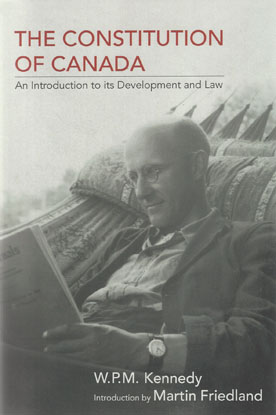
In his excellent introduction to this new edition of W.P.M. Kennedy's The Constitution of Canada: An Introduction to its Development and Law Martin Friedland - like Kennedy a past Dean of the University of Toronto Law School - notes that after much research, he is ending where he began, finding Kennedy to be "distinguished, engaging, and enigmatic."
Kennedy was indeed an enigmatic figure, in addition to being a brilliant historian. Emigrating to Canada from Ireland around 1913 - he was the eldest of ten children, and had run away from home at age fourteen - Kennedy made his way teaching and researching.
There were several "enigmatic" adventures along the way, as recounted by Friedland. Kennedy's skill as a teacher was legendary, and his abilities as a scholar on a range of topics including Tudor history and constitutional history were exceptional.
In 1922, Kennedy's large-canvas, ground-breaking study of the Canadian constitution was published (Kennedy was part of a wider renaissance at University of Toronto, where in 1922 two other important events took place: the discovery of insulin and the creation of the School of Graduate Studies). It was hailed as a success from the start, called "a work of great accuracy and conspicuous fairness," "alive, human, dramatic," "an admirable and most readable book," and "a book which will rank high in the literature of political science" (respectively, the Times, the Observer, the Law Quarterly Review, and the New Statesman).
Equally well-received in Canada (Saturday Night called it "brilliant" and "a monumental work"), it became and remained a classic text in both history and law until recently. Kennedy traces the development of Canada from the earliest days of the French explorers until 1922. The book is comprehensive in scope, covering the seigniorial system in Quebec, colonial policy, responsible government, federation, Canada as a dominion, the distribution of legislative power, the imperial tie and federalism.
Kennedy describes all the key events: the Royal Proclamation of 1763, the Quebec Act of 1774, the Constitution Act of 1791, Lord Durham's Report of 1840, the granting of responsible government in 1848, the British North America Act 1867, and later events up to and including 1922. Written by a scholar who had a profound knowledge of history, institution, and legal change, this book remains one of the best and most comprehensive examples of the process of nation-making.
Martin Friedland's fascinating introduction sketches out Kennedy's life and times - a time of much intellectual ferment - as well as outlining the importance of this book in the larger context of Canadian constitutional history.